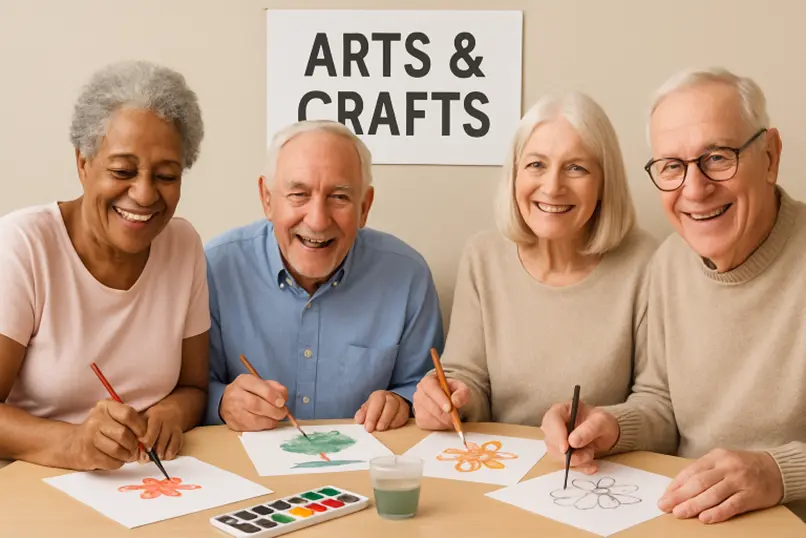Engaging older adults in creative pursuits is vital for their overall well-being, offering not only enjoyment but also significant health benefits. Activities that promote artistry, socialize, and stimulate the senses and mind can truly transform senior living experiences. Whether in a community environment or an independent setting, opportunities such as Washington Township Senior Living provide enriched programs that make creativity and connection a part of everyday life.
With enjoyable, meaningful activities, seniors can boost mood, reduce isolation, and boost cognitive vitality. These foster accomplishment and self-worth, vital for fulfilling aging lives. Creative pursuits, from gardening and music to tech learning, help tap into passions and discover new ones. Benefits extend beyond entertainment: they support mental health, preserve memory and attention, and enable meaningful interactions. For families and caregivers, fostering creative outlets is vital for holistic senior care. This article highlights top creative activities for older adults, with suggestions for all interests and mobility levels, including how to get started and resources for inspiration.
Arts and Crafts
Arts and crafts are enduringly popular for seniors, thanks to their versatility and adaptability. Activities such as painting, drawing, pottery, and knitting aren’t just hobbies—they nurture memory, problem-solving, and fine motor skills. Making art also provides a tangible sense of achievement, reinforcing self-confidence. Group craft sessions, whether in person or virtually, offer joyful opportunities to socialize and collaborate, alleviating feelings of loneliness while promoting creativity.
Music and Dance
Music and dance are powerful tools to uplift mood and evoke memories, frequently used in therapy for seniors, including those with Alzheimer’s or dementia. Listening to familiar songs, playing instruments, or participating in movement sessions stimulates both the brain and body. Dance classes—even gentle chair-based routines—can aid balance, flexibility, and coordination, while singing or music-making groups foster a sense of camaraderie and emotional expression. Research from the National Institutes of Health highlights the positive effects of regular musical engagement on senior cognitive health.
Gardening
Gardening blends physical activity with mental well-being and is easily adapted for different mobility levels, including raised garden beds and container gardening. The routine of tending plants provides purpose, while exposure to nature has proven mood-boosting effects. Growing vegetables, herbs, or flowers nurtures patience and responsibility and can be a communal effort in shared gardens, offering routine social interaction. Gardening also increases time spent outdoors, boosting vitamin D and promoting healthier sleep patterns.
Storytelling and Writing
Encouraging seniors to share their memories and experiences through storytelling or writing can have a profound impact. Memoir workshops, poetry clubs, and journaling groups foster reflection and strengthen memory, verbal communication, and organizational skills. Reading stories aloud or working in collaborative writing sessions creates space for meaningful social interaction. Documenting life stories also leaves a valuable legacy for families and communities.
Technology-Based Activities
Modern technology opens new doors for seniors eager to continue learning and expressing themselves. Digital photography, online painting programs, and virtual museum tours make the arts more accessible than ever. Video calling platforms enable remote game nights or writing groups, while digital workshops on storytelling or art expand learning options. Seniors can also join online communities to connect with others who share similar interests, helping them stay socially connected and invigorated even at a distance.
Group Games and Puzzles
Games and puzzles—ranging from crosswords and Sudoku to competitive trivia nights or classic board games—offer more than fun. These activities challenge memory, reasoning, and concentration, helping keep minds agile. Group play also cultivates a sense of community, collaboration, and friendly competition, which can be especially beneficial for older adults who may feel isolated. Regular cognitive stimulation through games is known to be linked with a slower rate of cognitive decline.
Cooking and Baking
Old and new recipes provide perfect ground for creativity in the kitchen. Group cooking classes or baking projects bring participants together, stimulating all the senses and reinforcing fine motor skills. Sharing the results with friends, family, or fellow residents encourages bonding and recalls positive cultural and familial traditions. Cooking is an interactive way to keep seniors engaged while introducing the joy of meal preparation and healthy eating habits.
Virtual Reality Experiences
Virtual reality (VR) technology offers seniors opportunities for immersive experiences like international travel, underwater exploration, and art therapy, which were previously inaccessible due to physical limitations. VR art sessions facilitate self-expression, while virtual games and group activities promote social interaction, teamwork, and cognitive engagement. This technology can broaden horizons, provide stimulating enjoyment, and foster connections for individuals with mobility restrictions. Integrating diverse creative activities, including arts, technology, gardening, and social play, into daily life significantly benefits older adults by building community, stimulating minds, enhancing their overall well-being, and encouraging vibrant and meaningful aging. Providing variety and new opportunities is crucial for enriching senior living experiences.
Embracing Creativity for Healthy Aging
Creative activities give seniors far more than entertainment—they nurture the mind, body, and spirit. Whether through hands-on crafts, the joy of music, the calm of gardening, or the innovation of technology, these pursuits promote cognitive health, physical activity, and social connection. By encouraging variety and participation, caregivers and communities can help older adults discover new passions, strengthen their sense of purpose, and maintain vibrant, fulfilling lives. Ultimately, creativity becomes a bridge to well-being, ensuring aging is not just about longevity but about living with joy, meaning, and connection.
Also Read
- Why Tech-Savvy Designers Are Turning to Virtual Tools for Better Results
- Top Memorial Quotes for Celebrating Life and Legacy
- The Right Words For A Celebration of Life Ceremony Invitation








